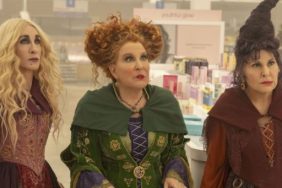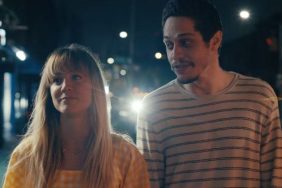Albert Brooks is the master of modern anxiety. Throughout a career comprised of brilliant performances and films, ranging from Broadcast News (which he didn’t direct) to Modern Romance, Defending Your Life and Mother (which he did direct), he has illustrated the nervous nature of the human spirit,and that desperate need to do the right thing, the smart thing, even though chaos seems to constantly be the result.
And although he only stars in Finding Nemo and Finding Dory, they feel as though they are of a piece with many of his films. As a clownfish named Marlin, a single father who will stop at nothing to protect his son, he looks at the world as a series of dangers. He only begins to really live with the help of Dory, voiced by Ellen DeGeneres, whose short term-memory loss precludes the sort of obsessive worrying that defined Marlin’s life so far.
I sat down with Albert Brooks to talk about his work in Finding Nemo and Finding Dory, what his films have meant to me personally, and what he thinks other people are getting out of his art. He’s learned a lot over the course of his career, and I consider myself lucky that he shared some of that zen-like knowledge with me.
Enjoy.

Warner Bros.
Also: Andrew Stanton & Lindsey Collins Explain Why ‘Finding Dory’ Was Necessary (Exclusive Interview)
Crave: I don’t get twitterpated terribly often but you basically changed my life…
Albert Brooks: Why?
Defending Your Life became a part of my personal ethos. A lot of my better decisions, that I’ve ever made, I thought about justifying myself in the afterlife and whether I was being guided by fear.
That’s a good thing. Has it helped?
It has helped. A lot of the better decisions I’ve made were made after thinking about Defending Your Life.
Well, I think anything that can reduce fear is positive, because fear is horrible.
It’s terrible. I live a lot of my life frustrated by anxiety.
Yeah, I think we all do.

Disney/Pixar
Which is one of the things I think is nice about the Finding Nemo movies, because Marlin, obviously he’s a nervous parent, and for a variety of very good reasons. But I think it helps kids look at anxiety and different ways to deal with anxiety, and also maybe understand their parents and why they freak out all the time.
Yeah, Finding Nemo has spawned so many sort of emotions over the years. I don’t even know that you could really understand exactly what parents and kids are seeing in it, but they can see a lot of different stuff.
What do you see in it? What is the appeal to you, as an actor or even as an audience member?
Well, I mean the first one was very specific, and that was a father losing his child. That was that. This [Finding Dory] is a little different but I actually, I was fond of Marlin’s relationship in this, because he’s not panicked about his son and he’s not a hundred percent wanting to go do this again, but he’s now doing something because it’s important to his son. It was like, “Look, we’re home, we’re safe, but I see that you need this… not for a physical reason, like I’ve got to go get you, but you need this for just some assurance from a parent.” So it felt a little bit calmer to me.
If you look at the original film, Marlin has been not just on a literal journey but a figurative journey. He’s grown a bit as a person. But now he has to apply to that, and he has to keep living in a way that’s selfless, a bit more adventurous, taking chances, helping the people he cares about…
Yes, I don’t think any character that’s that concerned ever becomes laissez-faire. I just don’t buy it. You know, we were getting some questions earlier [at the press conference]: “Do you plan or do you go with the flow?” And I said, “What flow? Where do you see a flow that you can go with? This world will eat you up if you don’t plan.”
But we want to reduce these ideas to something very simple, partially just for storytelling, particularly because it’s a story for children…
Yeah!
And we feel like they don’t get it, and I’m not sure that’s true.
Well by the way I think you can give children anything and they get it. As soon as you give it to them, they got it. It may be new for the first ten minutes but then they understand it. So I don’t really think that children are beyond understanding of anything, quite frankly.

Disney / Pixar
Do you have interactions with kids about these movies that surprise you? Did they get something out of it that you didn’t expect?
Well, I guess it might happen again but it hasn’t happened for a while. After Nemo came out I would go… if I where in a supermarket and a parent recognized me, I would [get] “Oh please, say something like Marlin for my child?” You know, there I am at frozen vegetables. “I don’t know, what do you want me to do?” “Sweetie, this is Marlin.” The kid: “What do you mean?” “This is the voice of Marlin.” “What are you talking about?” The kid doesn’t, is not processing this. “Please?”
“Look out, Nemo!”
And the kid’s eyes open, and now they’re confused and why is this man sounding like…
Oh no, we tore open the curtain!
Right! But it’s a lot of parents. “Please, will you just say my son’s name?!” I used to have people call. “Would you leave a message?” I don’t want to leave a Marlin message…
Do you get that for adults? Has anyone ever gone, “Could you sweat like in Broadcast News?”
[Laughs.] No, no. Not for a long time. But you know, yeah, people… if there’s something they can grab on to then they want it repeated right in front of them. You know? I’m sure at the height of Steve Martin, “Excuse me…” people asked him to say it a lot. Yeah.

20th Century Fox
Are you zen about that now? Is it flattering?
Oh, I’m way past zen. [Laughs.] I’m close to retirement. No, yeah, of course it’s flattering! Everything’s flattering. I think when you’re younger you sort of secretly want people to understand everything you understand, and get it exactly like you get it, and if they don’t you feel “Oh my god…” But the truth is, that’s not the way it works.
It’s really like a painting. You can admire that painting, and you can admire it because you like the sky, and the artist doesn’t even care about the sky. And really that’s what it is. Anything you get out of it, I’m grateful for. If I get too particular I’m going to get disappointed.
What is that like from a creative perspective, as you achieve that sort of understanding? When you’re writing, for example? Is it harder to focus because you feel like it’s all going to be okay? Or does it always work?
No, all you can do is write… if you start writing for someone else, then you’re dead. I mean look, there are people who are very wealthy, who have had long successful careers, who only write for someone else. You know? That’s their job. I wrote for stuff that I wanted to say.
Now if… [cell phone rings in the background] …an angel died!
If I started to think, “Well this is what I wanted to say, but I don’t know if you’ll get that,” I shouldn’t be doing it. Because that never is going to work! You know? So in other words you have to stay on beam and be willing to [accept that] people hate it, people like it, whatever. You can’t get off beam.
If I were the devil and I wanted to punish you, and you were a creator, I would give you huge success at something you didn’t understand. And then would I screw you up, because your hundred million dollar movie would be a movie that the studio made you change, and you wanted to have the mother die, and the studio wanted to have the mother remarry, and they made you remarry, and now everyone loves it, and you don’t know what the hell they’re loving! You know what I mean? If you get far away from your center you’re in trouble, I think.
Did you ever get close to that?
Yes.

20th Century Fox
Can you tell me?
Yes, I had a very terrible experience. I didn’t direct it, but I wrote with my partner at the time, Monica Johnson, we wrote this movie called The Scout, and the ending that’s on that movie now is a terrible, unfortunate decision the studio made.
That movie ended with that kid, who Brendan Fraser played, he pitched one strike and that was the end of the movie. So it was just his ability to make the game. And they put on a whole game, and they tested both versions in the same multiplex, and the version that you see [on the film now] tested like eight points more, which is meaningless.
And I got into a fight with 20th Century Fox. I didn’t work there forever. I mean I really went crazy. I said, “I’m going to be the one who gets the bad reviews, and this is going to do nothing to help this movie!”
That’s interesting. I’ve heard stories of endings getting completely subverted. At least it’s basically similar. It’s not like the complete opposite, like he quit.
No, but the thing is, you know, if you’re writing something and then they make it like an ending that’s a completely schmaltzy ending that you’ve never done before, that you just… then you’re like… I’m telling you, in The New York Times, I still remember because the review was, “Why would Albert Brooks write such an ending?” And I’m going, “He didn’t. He didn’t, god damn it.” You know?
That must have been brutal.
It’s okay to fail at something you understand. It’s hurtful. You’d rather people like it. But it doesn’t fuck you up. It doesn’t fuck up your mindset. But if you fail at something you suggested, that I hated, then it’s the worst of all worlds!
And you can’t even defend it…
You can’t defend it. That’s exactly right. That’s exactly right.

Paramount Pictures
When you look back, because you’ve done so many movies, is there one or more that is just extra special?
Well I try to make them all different, so they’re really different subjects. I’m really fond of Real Life because I think it anticipated a whole movement. And people forget, they talk about Spinal Tap, but that wasn’t… this was a mockumentary a long time before that. It was one of the early, early sort of mockumentaries. I like them all. Modern Romance, just the courage to leave the hair on my body, I think I should have gotten an award.
And you know, I like them all. I think today how hard they’d be to make for a movie theater. I think could make them for Amazon Prime, but I just don’t know who would make Lost in America and put it out in theaters. It’s sad that I think that but I think it might be true.
Even something like Mother, which is one of my mother’s favorite movies…
Yeah, I love Mother.
It’s a wonderful movie. We’ve watched it together many a time.
By the way it didn’t do shit. It made $24 million, which in 1996 was… it was not an expensive movie, so it’s not like it came and went, but I don’t know that I could pitch me and Debbie Reynolds today, to open at The Bruin. I don’t know. I don’t know!
Photo by Jason LaVeris/FilmMagic
William Bibbiani (everyone calls him ‘Bibbs’) is Crave’s film content editor and critic. You can hear him every week on The B-Movies Podcast and Canceled Too Soon, and watch him on the weekly YouTube series Most Craved, Rapid Reviews and What the Flick. Follow his rantings on Twitter at @WilliamBibbiani.






